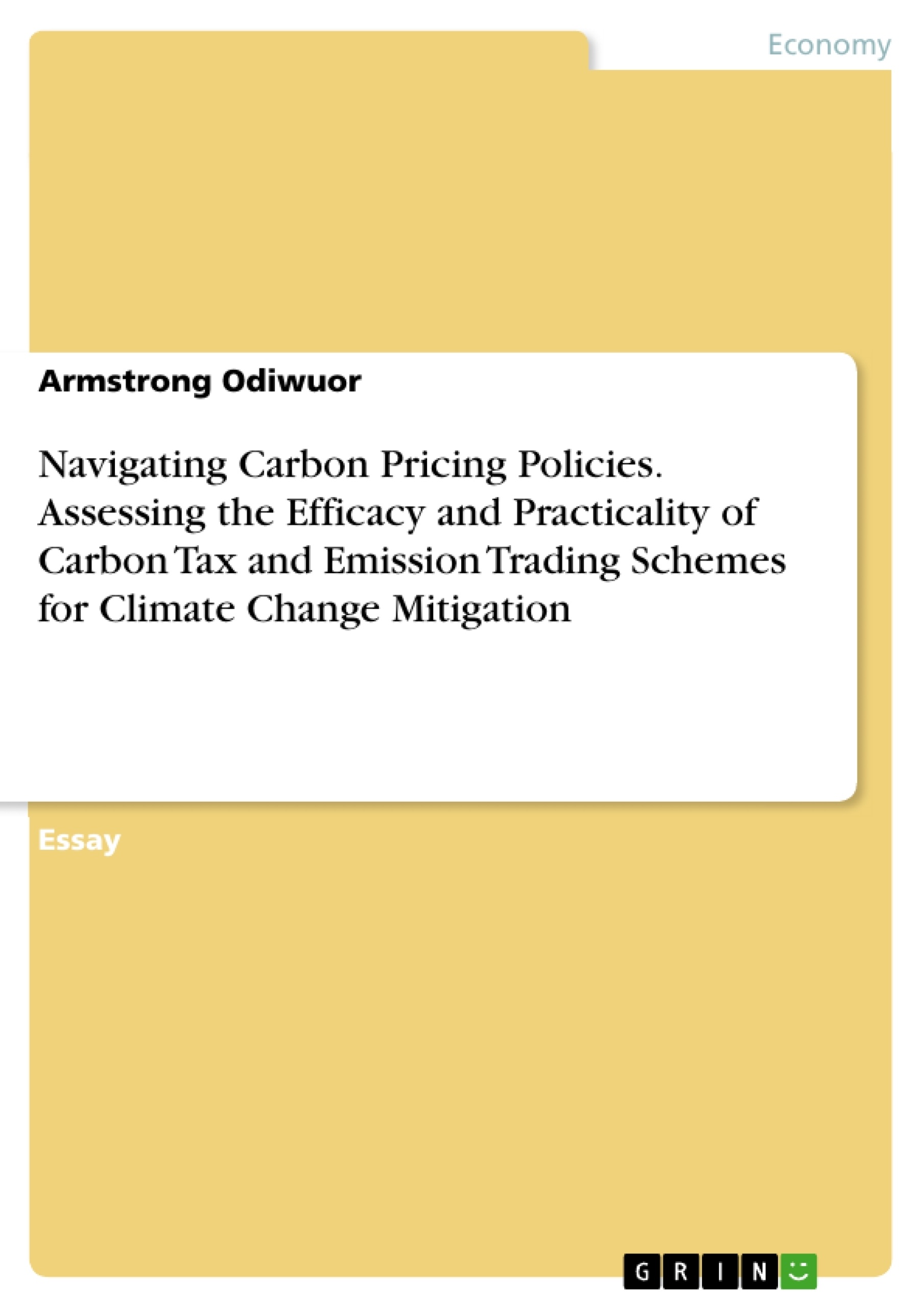Carbon pricing, encompassing carbon tax (CAT) and emission trading schemes (ETS), stands at the forefront of climate change mitigation policies. This paper critically examines the effectiveness and practicality of these policies, particularly in reducing carbon emissions. Drawing from existing literature, it argues that carbon tax offers significant advantages over ETS in terms of practical implementation, environmental impact, and economic efficiency. However, it acknowledges the complexities and challenges associated with both approaches. One key aspect analyzed is the certainty regarding cost and benefits of abating carbon emissions.
Carbon tax provides a relatively stable pricing mechanism, simplifying cost determination, while ETS offers more certainty about emission reductions and associated benefits. The paper discusses the trade-offs between these two approaches based on the shape of marginal cost and benefit functions, as proposed by Weitzman (1974). Revenue generation and utilization are also examined, revealing that carbon taxes tend to raise more revenue compared to ETS due to differences in pricing mechanisms. Effective utilization of these revenues is crucial for economic efficiency and addressing distributional concerns. Additionally, administrative requirements and political factors influencing policy adoption and design are discussed.
The paper also evaluates China's carbon pricing landscape in China, highlighting the challenges faced by its ETS program and proposing a hybrid approach incorporating carbon taxes. Such a hybrid system aims to address administrative burdens while ensuring broader coverage of carbon pricing across sectors and industries. In conclusion, while both carbon tax and ETS have their merits, carbon tax emerges as a more practical and effective option. However, the paper suggests that a hybrid approach, tailored to specific contexts like China, could offer a viable solution to carbon emission reduction challenges. Overall, the paper contributes to the ongoing discourse on carbon pricing policies and their implications for climate change mitigation efforts.
Inhaltsverzeichnis (Table of Contents)
- Introduction
- Certainty about Maximum cost and benefits
- Carbon Tax
- Emissions Trading Scheme (ETS)
- Revenue raising and usage
- Carbon Tax
- Emissions Trading Scheme (ETS)
Zielsetzung und Themenschwerpunkte (Objectives and Key Themes)
This paper critically analyzes the effectiveness of carbon tax (CAT) and emission trading schemes (ETS) in moderating carbon emissions and mitigating climate change. It argues that carbon tax offers practical, environmental, and economic advantages over ETS. The paper further examines China's emission situation and proposes policy designs for addressing the country's specific challenges.
- Comparison of carbon tax and emission trading schemes
- Analysis of the cost and benefit certainty in carbon pricing models
- Evaluation of revenue generation and utilization under different carbon pricing policies
- Application of carbon pricing policies to China's emission situation
- Discussion of the economic efficiency of carbon pricing revenues
Zusammenfassung der Kapitel (Chapter Summaries)
- Introduction: This chapter introduces the debate surrounding carbon pricing policies, outlining the two main approaches: carbon tax and emission trading schemes. It highlights the need to analyze the effectiveness and efficiency of these policies in reducing carbon emissions.
- Certainty about Maximum cost and benefits: This chapter examines the certainty of cost and benefit in abating carbon emissions under both carbon tax and ETS. It discusses the advantages and disadvantages of each policy in terms of predictability and quantifying the impact on emissions reduction. This chapter also includes a figure illustrating the deadweight loss of taxes versus permits.
- Revenue raising and usage: This chapter explores the revenue-generating potential of both carbon tax and ETS. It analyzes the differences in revenue collection between the two policies and discusses how these revenues are typically used. The chapter also examines the economic efficiency implications of revenue utilization.
Schlüsselwörter (Keywords)
The main keywords and focus topics of this paper are: carbon pricing, carbon tax, emissions trading schemes (ETS), climate change, cost-benefit analysis, revenue generation, economic efficiency, environmental benefits, China's emissions, policy design.
- Citation du texte
- Armstrong Odiwuor (Auteur), 2022, Navigating Carbon Pricing Policies. Assessing the Efficacy and Practicality of Carbon Tax and Emission Trading Schemes for Climate Change Mitigation, Munich, GRIN Verlag, https://www.grin.com/document/1453364



